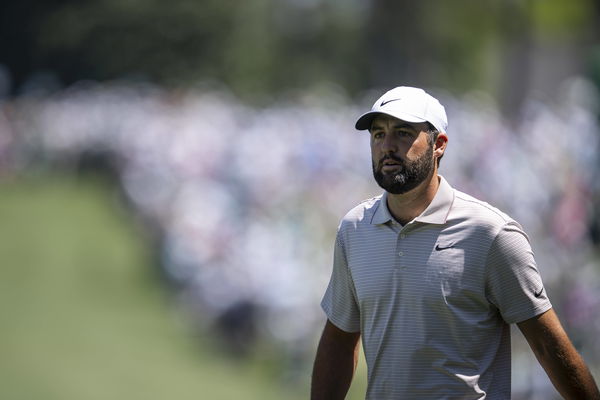
via Imago
250413 Scottie Scheffler of the United States during the final round of the 2025 Masters Golf Tournament on April 13, 2025 in Augusta. Photo: Petter Arvidson / BILDBYRAN / kod PA / PA1010 bbeng golf masters the masters augusta us masters *** 250413 Scottie Scheffler of the United States during the final round of the 2025 Masters Golf Tournament on April 13, 2025 in Augusta Photo Petter Arvidson BILDBYRAN kod PA PA1010 bbeng golf masters the masters augusta us masters PUBLICATIONxNOTxINxSWExNORxFINxDEN Copyright: PETTERxARVIDSON BB250413PA021

via Imago
250413 Scottie Scheffler of the United States during the final round of the 2025 Masters Golf Tournament on April 13, 2025 in Augusta. Photo: Petter Arvidson / BILDBYRAN / kod PA / PA1010 bbeng golf masters the masters augusta us masters *** 250413 Scottie Scheffler of the United States during the final round of the 2025 Masters Golf Tournament on April 13, 2025 in Augusta Photo Petter Arvidson BILDBYRAN kod PA PA1010 bbeng golf masters the masters augusta us masters PUBLICATIONxNOTxINxSWExNORxFINxDEN Copyright: PETTERxARVIDSON BB250413PA021
Keegan Bradley, the captain of Team USA, previously shared his plan to donate his $500,000 Ryder Cup stipend to charities. Naturally, the attention then shifted to World No. 1 Scottie Scheffler. Unlike Bradley, however, Scheffler’s initial response left the room tense.
A reporter asked Scheffler, “Obviously, this is the first time that the American players are receiving the stipend to go with the charitable giving. What’s your stance on that particular issue?”
“On that particular issue?” Scheffler repeated, clearly taken aback.
ADVERTISEMENT
Article continues below this ad
Now, to him and the team, the PGA of America’s decision to provide stipends—split between charity and personal use—wasn’t a problem, but an opportunity to support good causes. The debate, of course, dates back to 1999, when Tiger Woods first raised the question of Ryder Cup payment.
Bradley, speaking in the same press conference, said, “Ultimately, the PGA of America asked me to help out with this, and this is the best way we came up with to do it.”
But the use of the word ‘issue‘ by the reporter clearly rubbed Scheffler the wrong way. After clarification, Scheffler explained his approach.
View this post on Instagram
“I don’t know if we’ve met before, but my wife and I, we like to do a lot of stuff in our local community, and I’ve never been one to announce what we do. I don’t like to give charitable dollars for some kind of recognition.”
If you didn’t know, Scheffler has been donating generous amounts to various charities. In 2019, he made his first public donation of $50,000 to the Northern Texas PGA Foundation (NTPGA). Furthermore, in 2024 and 2025, the Dallas resident donated $50,000 to the Triumph Over Kid Cancer Foundation and the Kids Cancer Alliance. His signed cap was sold at an auction for $2,375.
Further, he added, “We have something planned for the money that we’ll be receiving. I think it’s a really cool thing that the PGA of America has empowered us to do. I have a deep passion for the city of Dallas, I have a deep passion for the organizations that we support at home, and I’m excited to be able to take this money and be able to do some good in our local community.”
Well, this year marks the first time U.S. Ryder Cup players will receive $500,000 each. Of that, $200,000 is automatically split between the PGA of America’s charity and one of the player’s choosing. The remaining $300,000 is provided as a stipend—but many players, including Bradley, Scheffler, and Patrick Cantlay, have already committed to donating their full amounts.
ADVERTISEMENT
Article continues below this ad
American team members promote philanthropy
Back in January, just after the stipend was announced for the team, Keegan Bradley had already shared that he would donate it to charity. In fact, now during the press conference, he reiterated his commitment. Bradley said, “The charity dollars hadn’t changed since 1999, and they asked me to shepherd their way into making it into 2025.”
He emphasized that this was a new era of the Ryder Cup, but at the same time, Bradley didn’t ditch the tradition. Notably, he also hinted that the players will follow suit. Bradley said, “The players are going to do a lot of good with this money.” Soon after that, Scheffler and Patrick Cantlay revealed their plans.
Talking about the charitable aspect, Cantlay said, “One of the great things about these team events for me is there’s always such a big charitable component to it, so I’m going to donate the money.” The golfer, who was under scrutiny for not wearing a hat, is still facing the same criticism. But this time, he has been vocal about the stipend being donated to charity.
ADVERTISEMENT
Article continues below this ad
With more golfers expected to follow suit, the philanthropic impact could be substantial. If all 12 players, plus Bradley, donate their stipends, charities could receive as much as $6.5 million.
By leaning into charitable donations, Team USA may turn a once-controversial debate into a legacy of giving—softening scrutiny and highlighting the Ryder Cup’s power to do good far beyond the golf course.
ADVERTISEMENT
ADVERTISEMENT
ADVERTISEMENT
ADVERTISEMENT


